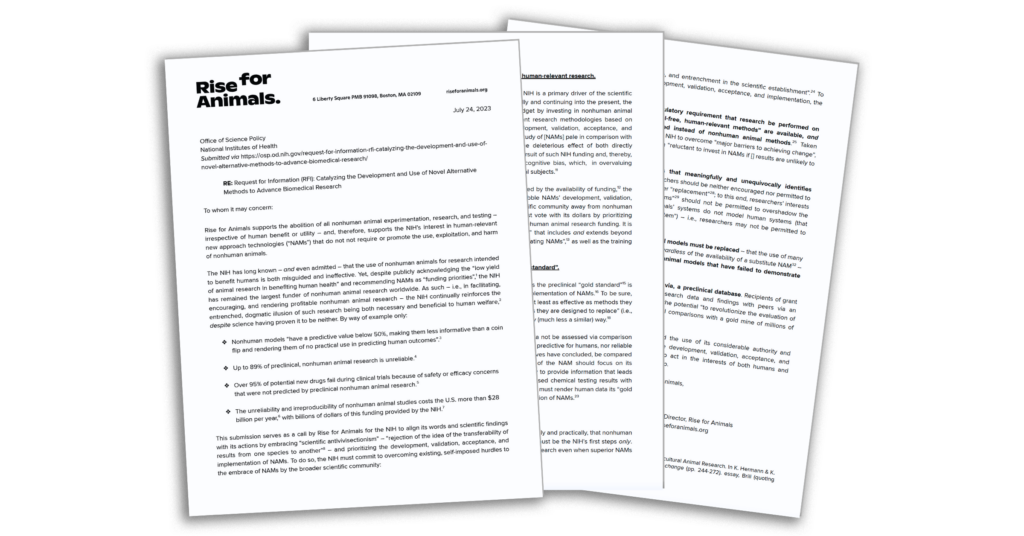
Hollow Claims of the Animal Research Industry Mislead Us All
In response to increasing opposition to the practice of vivisection, animals researchers have clung to and pronounced with shocking abandon the following talismanic statement: “‘Virtually every medical achievement of the last century has depended directly or indirectly on research with animals.’”
As an animal rights organization, we at Rise would continue to oppose all nonhuman animal research even if this was true, but, the fact is, it’s not.
This statement originated in a 1994 one-pager put out by the U.S. Public Health Service without any citations. Rather, as Robert AJ Matthews, physicist and science writer, observes: “this [claim] is simply asserted” and “[s]ubsequent reiterations of the claim either cite this original unreferenced source, or merely assert it in turn essentially verbatim.”
Problematically, this unmoored claim has never been and cannot be validated.
As Matthews explains, even if we could validate that “virtually every medical achievement of the last century has involved animal models”, there are simply no means by which to validate that nonhuman animal models “provided demonstrable evidential weight, leading to a positive outcome.” Why?
Because “[t]here is a difference between animals being necessary for an advance as opposed to merely being sufficient for that advance” or merely being used for that advance.
And herein lies one of the animal research industry’s most prolific and troubling deceits:
Because the federal government legally required the use of nonhuman animals in research through the end of 2022 (and arguably still effectively requires animal use today), researchers can rightly claim that nonhuman animals have been exploited for every recent medical endeavor – but they don’t stop there. They continue on to encourage, if not outright galvanize, the public to infer that these successes would not have been possible without nonhuman animals.
Though the use of nonhuman animals can be proven, their necessity cannot.
Animal researchers cannot (and have not even attempted to) provide data supportive of the proposition that nonhuman animal research has been necessary for medical advancement. Scientists, like Matthews, identify several causes for their inability, including “a striking paucity of quantitative comparative data for animal models”. Moreover, of the animal model data that is available, most is “incomplete, ambiguous, and subjected to inadequate or incorrect analysis”, leading to “estimates for the evidential weight of animal models that [are] at best inconclusive, and sometimes wholly misleading.”
The NIH, as part of the U.S. Public Health Service, continues to tout and promote its wholly unverifiable claim by providing billions upon billions of dollars annually for nonhuman animal research.
Last week, we discussed the NIH’s funding of basic research, as well as its resistance to sharing with the public how it spends taxpayer dollars; and we recognized that those of us seeking to promote ethical, human-relevant research need to champion greater transparency in government-funded research. Which is to say:
We need to hold the NIH accountable.

Aside from supporting the COST Act, we need to remain vigilant in vetting NIH pronouncements through the lens of verifiable fact. To this end – and in response to the NIH’s invitation for public comment specific to the development and implementation of non-animal research methods based on human biology – Rise for Animals has submitted a comment that seeks to lay bare the NIH’s feigned naivete: though it implies a failure to fully appreciate current hurdles to the transition away from nonhuman animal research, the NIH itself is responsible for erecting and maintaining the staunchest and most intractable of these hurdles.